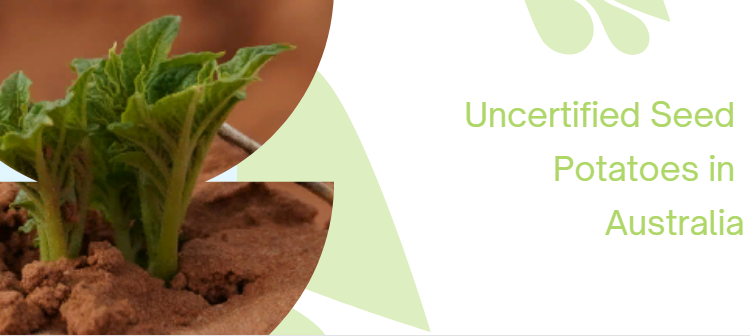#UncertifiedSeed #SeedPotatoes #CertifiedSeed #PotatoProduction #Agriculture #Traceability #DiseaseRisk
Uncertified seed potatoes play a significant role in the Australian agricultural sector, offering an alternative source for potato growers. While certified seed potatoes are the preferred choice due to their known origin, health status, and traceability, uncertified seed potatoes have gained attention among some farmers. This article delves into the various categories of uncertified seed potatoes found in Australia, their development, and the potential consequences of utilizing such seeds in commercial potato production systems.
Categories of Uncertified Seed Potatoes:
‘Farm Saved’ or One-Off Certified Seed:
‘Farm saved’ seed potatoes are produced on-farm from known certified seed but outside the official seed certification program. This category allows farmers to grow seed potatoes that meet specific end-use requirements, such as physiological age, while being monitored by the grower for disease and quality. Although uncertified, these seeds offer some level of control and predictability.
Uncertified Seed from Commercial Potato Crops:
Another category of uncertified seed potatoes comprises small tubers graded off from commercial potato crops. These tubers lack traceability to their origin or known health status. This type of seed is considered high risk for commercial potato production systems due to the potential presence of diseases or pathogens that could negatively impact yield and quality.
Development of Uncertified Seed Potatoes:
The development of uncertified seed potatoes can be attributed to various factors. Some farmers choose to save and replant seed potatoes from their own certified seed stock, allowing them to maintain a certain level of self-sufficiency and control over the seed supply. Others may opt for uncertified seed due to limited availability, cost considerations, or specific end-use requirements that may not be met by certified seed.
Consequences of Utilizing Uncertified Seed Potatoes:
Using uncertified seed potatoes in commercial potato production systems poses several risks and consequences. The lack of traceability and known health status increase the potential for introducing diseases, pests, or pathogens into the crop. This can result in reduced yields, compromised crop quality, and increased susceptibility to various potato diseases. Moreover, uncertified seed potatoes may lack the desirable traits and characteristics offered by certified seed, such as improved resistance to specific diseases or better crop performance.
The importance of certified seed potatoes:
Certified seed potatoes have been developed through rigorous testing and certification processes, ensuring high quality, disease-free planting material. Certified seed provides farmers with a reliable source that offers traceability, known health status, and adherence to specific standards and regulations. Investing in certified seed is crucial for maintaining healthy and sustainable potato production systems, reducing the risks associated with uncertified seed.
Uncertified seed potatoes, including ‘farm saved’ seed and untraceable tubers from commercial crops, offer alternative options for potato growers in Australia. However, the utilization of uncertified seed carries risks and consequences for commercial potato production systems. The lack of traceability and known health status increases the potential for disease introduction and compromises crop performance. Therefore, prioritizing certified seed potatoes remains essential for ensuring the long-term health, productivity, and sustainability of the potato industry.
Source: Australian Potato Growers





